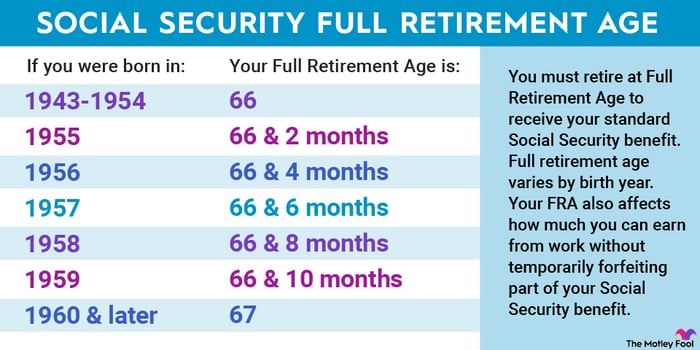For today’s workers, retirement may look much different from that of previous generations.
Fifty-six percent of baby boomers expect to continue working past age 70 or never retire at all, according to a 2024 report from the Transamerica Center for Retirement Studies, and 82% of that group is doing so for financial reasons.

Image source: Getty Images.
Taking Social Security while working can be a smart way to increase your monthly income and enjoy a more comfortable retirement. However, there are some limitations around how much you can receive in benefits if you’re still working.
If you’re considering working either part-time or full-time after taking Social Security, here’s exactly how to decide whether it’s worthwhile.
How much are you earning?
Two of the most important factors in deciding whether you should keep working after taking Social Security are your earned income and your age.
If you’re under your full retirement age (FRA), your benefits could be withheld depending on how much you’re earning from your job. The FRA is age 67 for everyone born in 1960 or later. If you were born before 1960, or FRA is either 66 or 66 and a few months.

Image source: The Motley Fool.
Whether or not your benefits will be withheld (and how big of a reduction you’ll see) will depend on how much your income exceeds the retirement earnings test limit. This is an annual limit specifically for people working while on Social Security, and the higher your income, the bigger the reduction.
There are two limits, depending on whether you will or will not reach your FRA this year. In the months leading up to your FRA, you’ll be subject to a much higher limit. But if you’re well below your FRA, your benefits could be reduced substantially.
| Income Limit: 2024 | Income Limit: 2025 | Benefit Reduction | |
|---|---|---|---|
| If you will reach your FRA this year | $59,520 | $62,160 | $1 for every $3 over the limit |
| If you won’t reach your FRA this year | $22,320 | $23,400 | $1 for every $2 over the limit |
Source: Social Security Administration. Table by author.
Sometimes, these reductions can add up to hundreds of dollars per month. Depending on how much you’re collecting from Social Security and what you’re earning from your job, your entire benefit amount could even be withheld.
For example, say you’re 62 years old with an FRA of 67, and you’re working part-time earning $25,000 per year. You’re well under your FRA, so you’ll be subject to the $23,400 annual limit for 2025. Your income is $1,600 over that limit, resulting in a reduction of $800 per year, or around $67 per month.
Again, though, the higher your earnings, the steeper the reductions. Let’s say, for instance, that instead of working part-time earning $25,000 per year, you’re still working full-time while earning $50,000 per year. All other factors remaining the same, your benefits would be reduced by $13,300 per year, or $1,108 per month.
One big perk to consider
Despite the benefit reductions, there is one major advantage of working while on Social Security: You’ll earn larger checks down the road.
The income limits only apply while you’re under your FRA. Once you reach your FRA, the Social Security Administration will recalculate your monthly payment to account for any benefits that were withheld. You’ll earn larger payments from then on, and your income will no longer affect your Social Security.
When deciding whether it’s worthwhile to work while taking benefits, perhaps the most important consideration is how much you’ll be leaning on Social Security in the short term.
If you go back to work because you need the money right now, that may not help as much as you expect if your benefits are slashed substantially because of your income. But if you’re looking to boost your benefit for the long term, continuing to work now can earn you larger payments for decades after you stop working.
Working while on Social Security can be a smart way to increase your income, but it’s important to consider how any short-term reductions could affect your plans. By weighing the pros and cons of working in retirement, you can make the most informed decision for your situation.
The $22,924 Social Security bonus most retirees completely overlook
If you’re like most Americans, you’re a few years (or more) behind on your retirement savings. But a handful of little-known “Social Security secrets” could help ensure a boost in your retirement income. For example: one easy trick could pay you as much as $22,924 more… each year! Once you learn how to maximize your Social Security benefits, we think you could retire confidently with the peace of mind we’re all after. Simply click here to discover how to learn more about these strategies.
View the “Social Security secrets” »
The Motley Fool has a disclosure policy.
 benzinga.com
benzinga.com fool.com
fool.com



